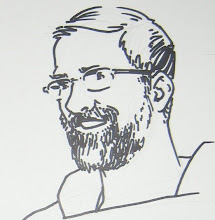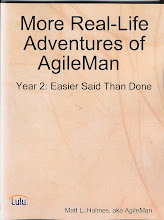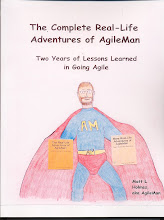
I'm reading a book called The Brain That Changes Itself, by Norman Doidge, M.D. In it, the author describes many different examples of the human brain's neuroplasticity, which is to say: its ability to change itself based on various stimuli. For decades, the belief was that each part of the brain had a certain, unchangeable function to perform. This implied that an injury to any part of the brain meant the loss of that type of functionality, forever. More recently, though, neurologists have begun to uncover many examples where the organ inside our skulls is actually much more adaptive than that rigid model would allow for.
One of the topics that Dr Doidge covers which certainly applies to Agile is the importance of continuing to learn, even after completing the scholastic period of our lives. In studies that have been done with those in their sixties and beyond, there's clear evidence that elderly individuals who seek out ways to engage their mind - such as by learning a new language or dance, taking on a new hobby or even just visiting locales that they've not been to before - are less likely to suffer from dementia and other symptoms typically related to "the aging of the brain." New neuro-connections continue to form as we get older, but only if we exercise our mental facilities during that latter stage of life. As Dr Doidge points out, it's still possible that it may be a correlation rather than causation relationship, or even causal but in the other direction. In other words, those who are actively keeping their minds fine-tuned may only be able to do so exactly because they aren't losing their edge (rather than the activities being responsible for the sharp minds). But research is making that seem less and less likely, and so I'm inclined to believe that there is more of a positive cause and effect relationship at work in those scenarios, and certainly the rest of the book is a tour of amazing brain-alterations that have been observed by researchers.
So if we accept - optimistically, perhaps! - that learning really does help to fight off some of the effects of aging (such as senility and dementia), then how do we adopt a way of life that promotes learning? In my capacity as Agile Manager between 2006 and 2008, I encountered a lot of individuals who truly epitomized the answer to that question. For them, the focus was always on discovering new ways to make their product better. Often, the people around them (especially in management) were fixated on "hitting a date", which often translated to "cutting corners." The friction caused by the intersection of those two very different approaches was probably healthy, in the final analysis, although it rarely felt that way at the time.
In life, though, we're less likely to constantly run into schedule pressures in quite the same way as we do in our vocation as software craftspeople. Granted, there may never seem to be enough time in the day, but we still get to decide - within reasonable bounds, set by family obligations - just how to spend our spare time. Do we "veg out" and turn our brain off every chance we get, or do we look for ways to stimulate our mind and imagination? Are we always satisfied with the way things are, or do we look for paths to improvement? Have we locked ourselves into a comfortable pattern, or are we still growing in ways not related to our waistlines?
I obviously have a lot more free time now than I did just a year ago. Even so, I've made a conscious effort to spend significant portions of it reading, writing and generally trying to bring my overall understanding of the world around me to a higher level. I'm also finding that my "second career" as a Math tutor is requiring no end of learning on my part (how's that for irony?) as I discover that every child really is different, and therefore no one approach works for every situation.
Will any of that do any good? Am I still destined to end up senile (or, as AgileBoy would put it, "more senile")? I don't have any answers, but I think it's important that we all all keep asking questions.





No comments:
Post a Comment